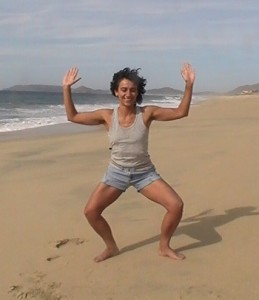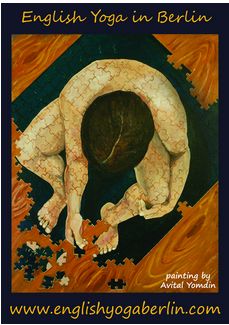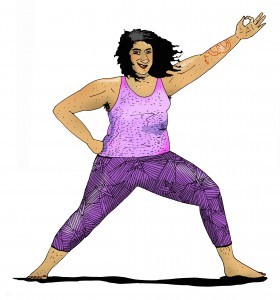A Return to a Drishti Definition
Almost 5 years ago, we wrote a 2-part blog about what Drishti is and its meditative benefits. From it’s Sanskrit meaning, coming to a Drishti definition in English is complicated. But as we wrote in our blogs, we can put it simply as “the gaze” or “where one’s eyes rest.” Once again, I’d like to return to the topic, but this time from a practical point of view, both in a yoga class and outside of it.
Drishti is about focus
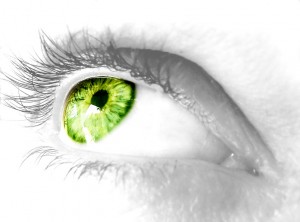
Drishti Definition
In an asana yoga class, your teacher may ask to use your Drishti point to keep you balanced and focused. In balancing poses, we can use this point as a focus point, a point that does not move, to help steady our inner ear – where our sense of balance is located. For those of us who feel queasy in bumpy traffic or on boats, we know that staring at the horizon line can help us to overcome motion sickness. Using this focal point in an asana class encourages our bodies to find a posture in that helps us feel steady. In this sense, Drishti is a very tangible and useful anatomical tool. Where your gaze rests is a pretty good indicator of the line your neck and spine are following.
When we turn our focus towards our navels, in Cat/Cow or in Downward Dog, for instance, we are turning our focus inwards, towards ourselves. And when we look out over our finger tips in twists or Warrior poses, we keep our central line from ourselves outwards towards a blurry outside world. It helps you to quiet the mind, increases concentration and relaxation, and allows your attention to flow into whatever you are focusing it on, yourself and your connection / support to the world. It helps us to not look around and get distracted by the other people practicing in the room, which for some of us can turn to negative thoughts if we compare ourselves and how we do the postures, or worry if we are doing them “right.”
Another important subtlety in the concept of Drishti is in the different ways of gazing. This is a variation on the practice of detachment but specifically, a Drishti can be described as ´soft´, ´pointed´, ´wide´, ´gentle´, etc. Again, there are very practical reasons for this. Even though Patanjali never gazed at a computer screen, he could imagine what hours of single distance, harsh gazing can do to your eyes. Varied distances of Drishti, as well as varying degrees of hardness or staring in the postures, helps to exercise the optical nerves and reduce the strain that can produce tension headaches.
Early yogis and yoginis realized that the quality with which you observe something radiates through your body. Your body naturally becomes more tense and rigid, or soft and relaxed, depending on how you are looking at something. A soft Drishti promotes internal reflection, relaxation, meditation. A harder one pushes the focus externally. In our contemporary world, we often find our attention being pulled in multiple directions at once, our eyes have no time to rest on anything. A regular yoga practice can help train us to focus ourselves, but only when we take it outside of the yoga studio, do we feel the real benefits. A Drishti point can to calm our thoughts, reduce chatter and anxiety, allow our breath to flow freely, and give us something to dream about other than who posted what on Facebook.
So, the next time you find your eyes wandering, watch your mind and body, and see if you can notice how your Drishti affects you, notice how you feel when you let your eyes rest on something that you don’t normally allow them – give some attention to that plant on your windowsill, follow the path of a beetle in the sand, notice what the squirrels are doing in the tree in your yard. And next time you practice yoga, play with your gaze point and see how it affects your practice and your life.
One of our main goals in our Kreuzberg Berlin yoga classes is to educate people about the benefits of our practice. We believe that by making yourself more centered and focused you are better equipped to make an impact in the world around you. For more info about our Hatha Yoga in Berlin or Vinyasa Yoga, check out our yoga in English schedule.
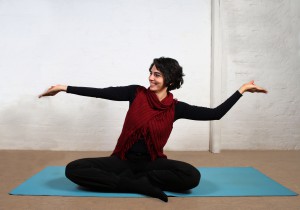






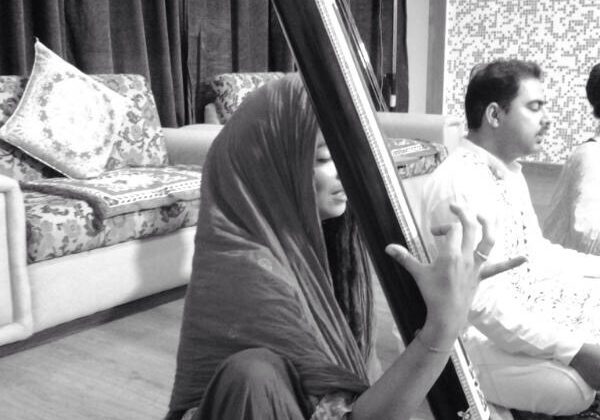




 Summer Closures
Summer Closures
